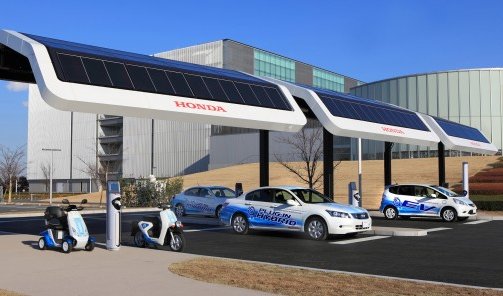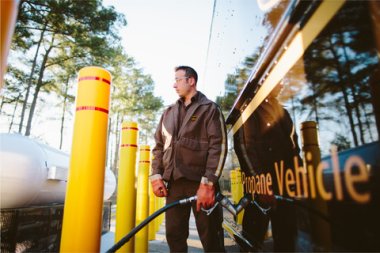 UCS rates PEV energy emissions: The Union of Concerned Scientists is seeing real improvements in how clean plug-in electrified vehicles really are based on what’s powering the electricity. The study found that the overall global warming emissions from driving an electric vehicle is significantly lower for most of the US. Data comes from a U.S. Environmental Protection Agency report on emissions from electricity generation through the end of 2014; the last UCS reported had looked at 2009 data reported in 2012. Global warming emissions from electricity generation have fallen in since 2009 in many parts of the US, making PEVs even cleaner. The average electric vehicle in the US now produces emissions equivalent to a hypothetical gasoline car achieving 73 mpg, according to UCS. About half of PEVs sold have gone to California, which had a 95 mpg emissions equivalent rating. The next 5 states for PEV sales (Georgia, Washington, New York, Florida, and Texas) made up 20% of US PEV sales and are regions that have emissions ratings of 50 mpg or better.
UCS rates PEV energy emissions: The Union of Concerned Scientists is seeing real improvements in how clean plug-in electrified vehicles really are based on what’s powering the electricity. The study found that the overall global warming emissions from driving an electric vehicle is significantly lower for most of the US. Data comes from a U.S. Environmental Protection Agency report on emissions from electricity generation through the end of 2014; the last UCS reported had looked at 2009 data reported in 2012. Global warming emissions from electricity generation have fallen in since 2009 in many parts of the US, making PEVs even cleaner. The average electric vehicle in the US now produces emissions equivalent to a hypothetical gasoline car achieving 73 mpg, according to UCS. About half of PEVs sold have gone to California, which had a 95 mpg emissions equivalent rating. The next 5 states for PEV sales (Georgia, Washington, New York, Florida, and Texas) made up 20% of US PEV sales and are regions that have emissions ratings of 50 mpg or better.
Daimler and BAIC forge joint venture: Daimler has signed a partnership with Chinese automaker BAIC Group for investing in new energy vehicles in the China market. Daimler will acquire a minority share in Beijing Electric Vehicle Co., Ltd. (BJEV), a subsidiary of the BAIC Group, for strategic collaboration with BAIC in the NEV sector. As another part of the agreement, investment will also be placed in the upgrade of the current production facilities at their joint venture Beijing Benz Automotive Co., Ltd. (BBAC), to facilitate electric vehicle production. Last month, Volkswagen and Jianghuai Automobile Group (JAC Motors) were granted approval to manufacture plug-in vehicles in China. The joint venture’s approval by China is to build 100,000 battery electric vehicles.
Another electric pickup: Canadian startup Havelaar this week unveiled the Bison all-electric pickup truck. It appears to be in the concept phase and will take a few years to get out there and compete with electric pickups like the Workhorse W-15 and maybe Tesla. It would be impressive, if it makes it to market, with a driving range of 186 miles per charge. It’s being built to drive through rough, weather-extreme sections of Canada and other markets. Havelaar Canada is being led by Tony Han, who helped launch the Havelaar Electric Vehicle Research Center (UTHEV) at the University of Toronto. Two other professors will be leading the venture with Han.
 Propane autogas incentive program deadline: Time is running out for fleets to take advantage of the Propane Education & Research Council’s Quick-Connect Nozzle Incentive Program. Private fleets and public refueling stations have until June 30 to apply for the incentive program, which provides $100 per tank-side connector and $1,000 per hose-end connector. The new double incentives of $100 per tank-side connector and $1,000 per hose-end connector were expanded on March 1, 2017, to further help fleet owners replace their current refueling technology. Begin the application process by completing the online form at propanecouncil.org.
Propane autogas incentive program deadline: Time is running out for fleets to take advantage of the Propane Education & Research Council’s Quick-Connect Nozzle Incentive Program. Private fleets and public refueling stations have until June 30 to apply for the incentive program, which provides $100 per tank-side connector and $1,000 per hose-end connector. The new double incentives of $100 per tank-side connector and $1,000 per hose-end connector were expanded on March 1, 2017, to further help fleet owners replace their current refueling technology. Begin the application process by completing the online form at propanecouncil.org.



